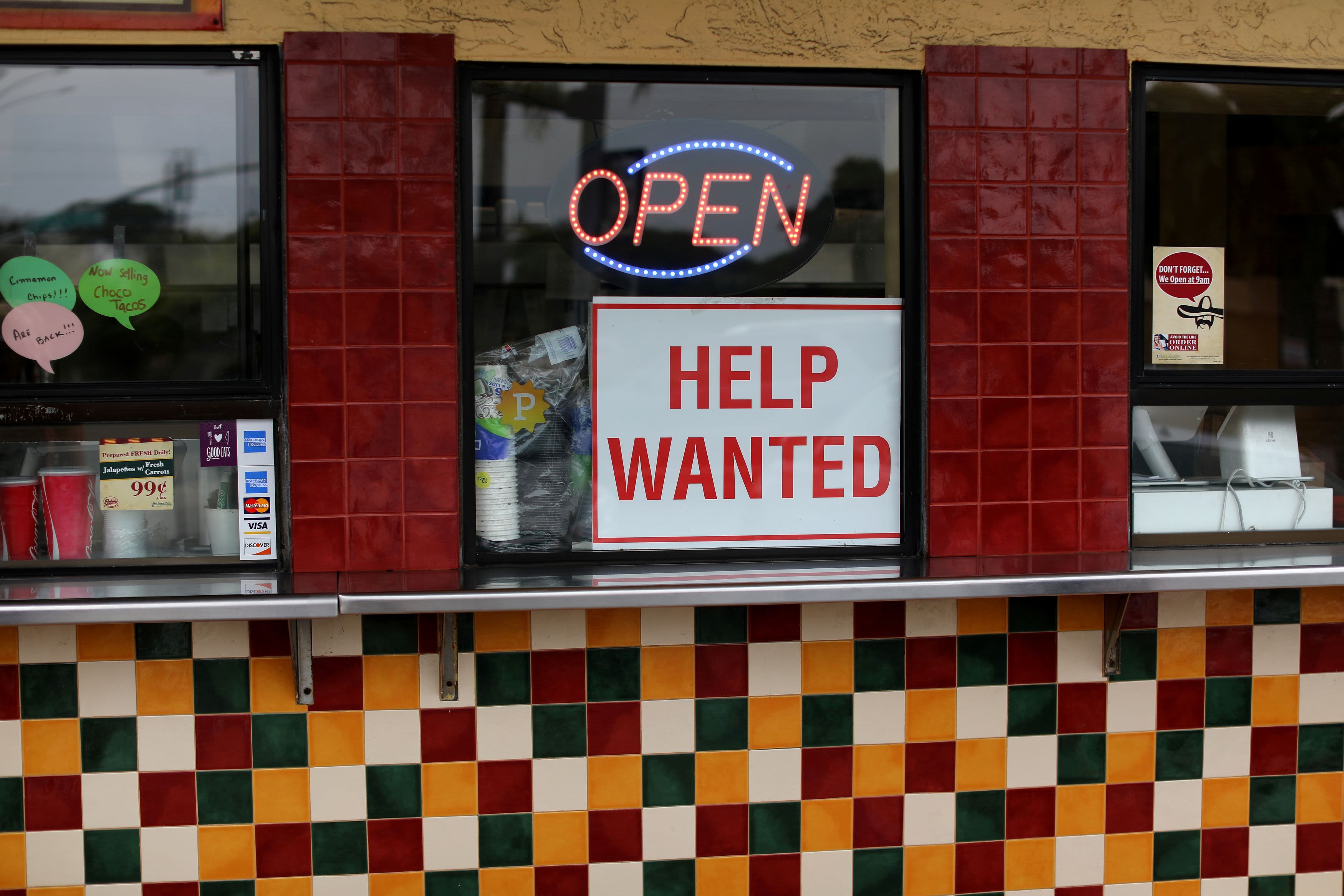A help wanted sign is posted at a taco stand in Solana Beach, California.
Mike Blake | Reuters
Job growth in September was expected to have been less robust than August as some companies made layoffs permanent and others looked to trim costs.
The September report, released Friday at 8:30 a.m. ET, is expected to show 800,000 nonfarm payrolls were added, compared to 1.37 million in August, according to Dow Jones. The monthly employment report is the last to be released prior to the presidential election in November.
It is expected to show the steady recovery in the labor market since millions of jobs were lost in March and April due to the pandemic. Leisure and hospitality are expected to show job gains as the economy continues to reopen, and construction is expected to have been a strong area, due to the surge in home building.
The unemployment rate is projected to fall to 8.2% from 8.4%, according to Dow Jones.
“It’s kind of a bad news, good news situation. The bad news is we’re only half way back to the pre-pandemic level for payrolls. I think we’re still making progress,” said Stephen Stanley, chief economist at Amherst Pierpont. “It’s still such a long way to go that we’re going to get a few more months of pretty significant increases. We’ve seen a gradual deceleration from month to month, and I think that should continue.”
Stanley expects to see just over 1 million jobs added and the unemployment rate fall to near 8%.
This week Disney said it would eliminate 28,000 jobs, mostly at theme parks, and the airlines are expected to lay off tens of thousands more workers if they don’t receive government aid. The Disney layoffs come as Disneyland in California remains closed because the state has not allowed theme parks to open.
Stanley said those layoffs are related to specific Covid-related circumstances, but other businesses are cutting staff as businesses look at their current activity.
“I think some of the other ones you’re seeing, some of the Wall Street layoffs, that’s a different story. That’s more a return to normal management,” Stanley said. “You’re not going to lay off anyone during a crisis. You have to be careful taking some of these headlines and saying there’s a crazy amount of layoffs.”
What could keep the numbers down
Grant Thornton economist Diane Swonk is not as upbeat in her assessment of the September job growth. She expects that 700,000 jobs were added, and 750,000 before the impact of government census workers leaving the workforce.
She said there should be some leisure and hospitality hiring but September includes Labor Day, when some seasonal hiring is pared back.
“Leisure and hospitality is still 4.4 million in the hole, and it’s dominated by food service,” she said. Winter is coming and outdoor dining could end in some places, leading to more layoffs.
Swonk said she is also concerned that online schooling is hurting the job market for parents who can’t return to work and because schools don’t need as much staff in buildings.
Economists say fiscal stimulus, being negotiated between Treasury Secretary Steven Mncuhin and House Speaker Nancy Pelosi, could be key for the economy and job market.
“This is the last [jobs report] before the election. Our biggest concern is if the Covid recession which was supposed to be short-lived, is metastasizing into a traditional recession, which is longer lasting,” Swonk said.
Mark Zandi, chief economist at Moody’s Analytics, said he expects just 550,000 jobs, including the loss of 100,000 state and local government positions.
“We’re still down 11.5 million jobs. We’ve gotten back half the jobs we lost in March and April,” Zandi said. “Even if we got to 1 million a month, we’ve got another year to go and we’re not going to get a million a month.”
Zandi said the economy and jobs market need a new stimulus package.
“If they don’t pass the piece of legislation to provide more support then I think the job market will just weaken and we’ll see job losses before the end of the year,” Zandi said. “if the they don’t pas any more fiscal support the jobs gains will turn into jobs losses. The boost from the reopening is going to continue to fade.”
Zandi said the economy could return to a higher gear if the pandemic were no longer to be a factor.
